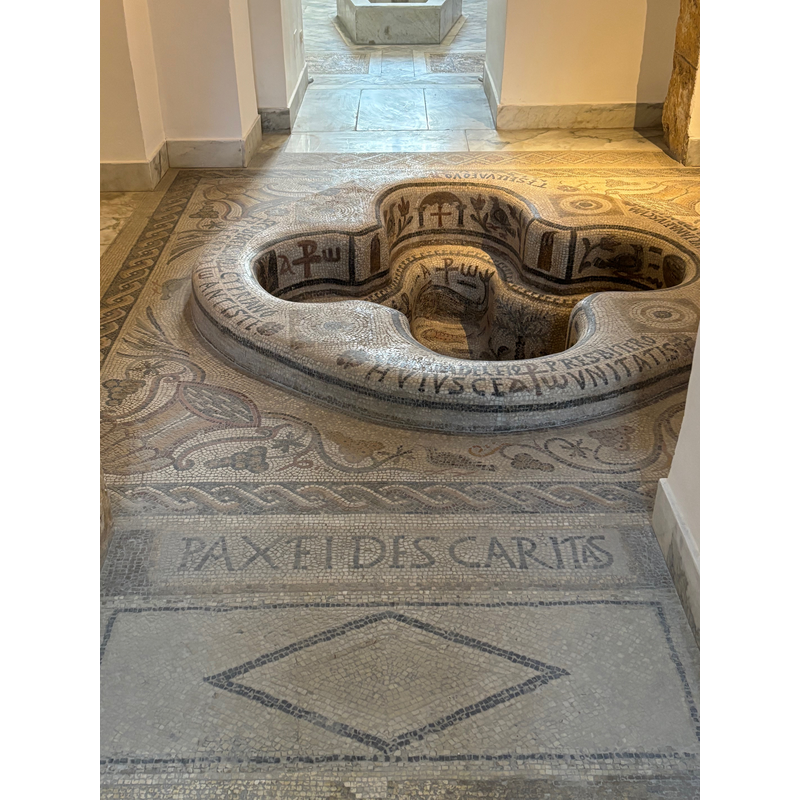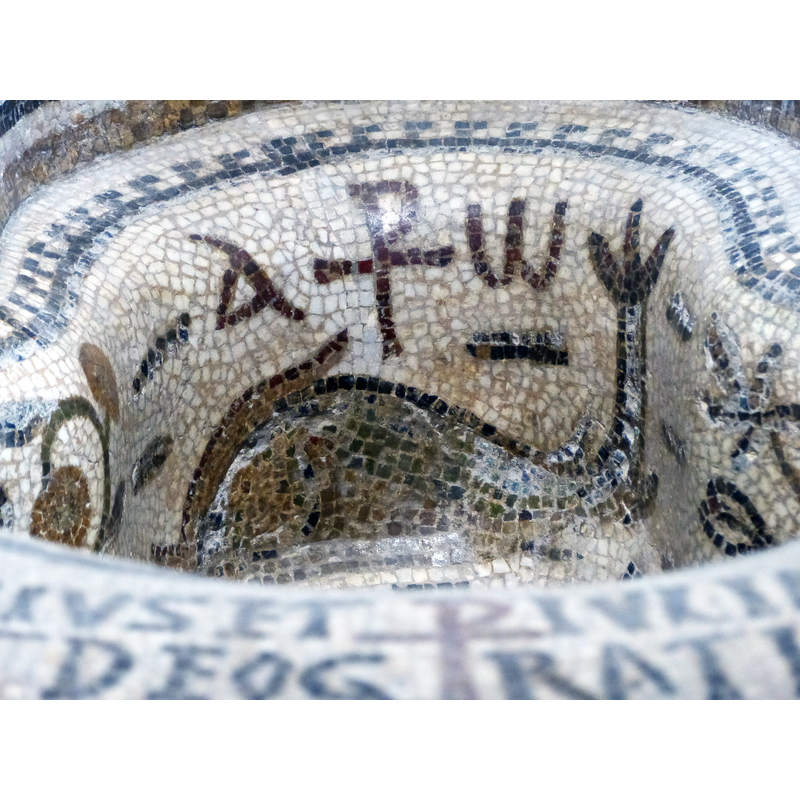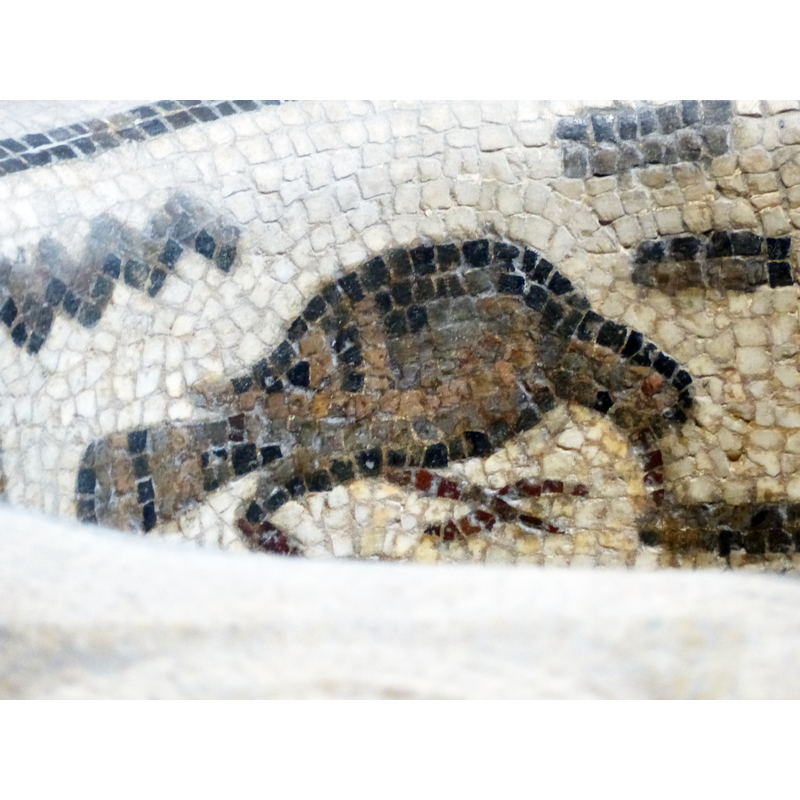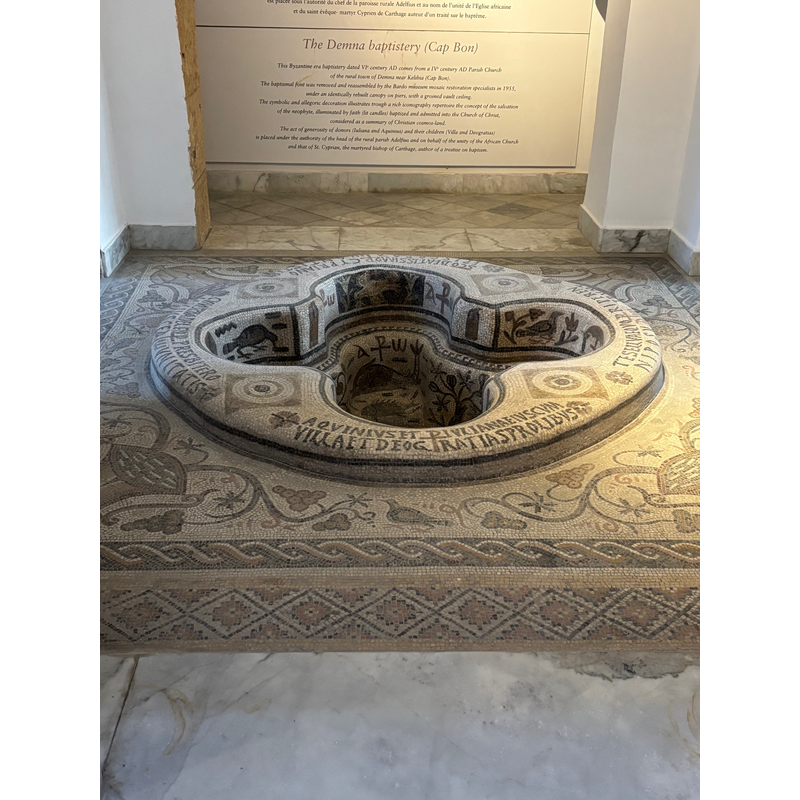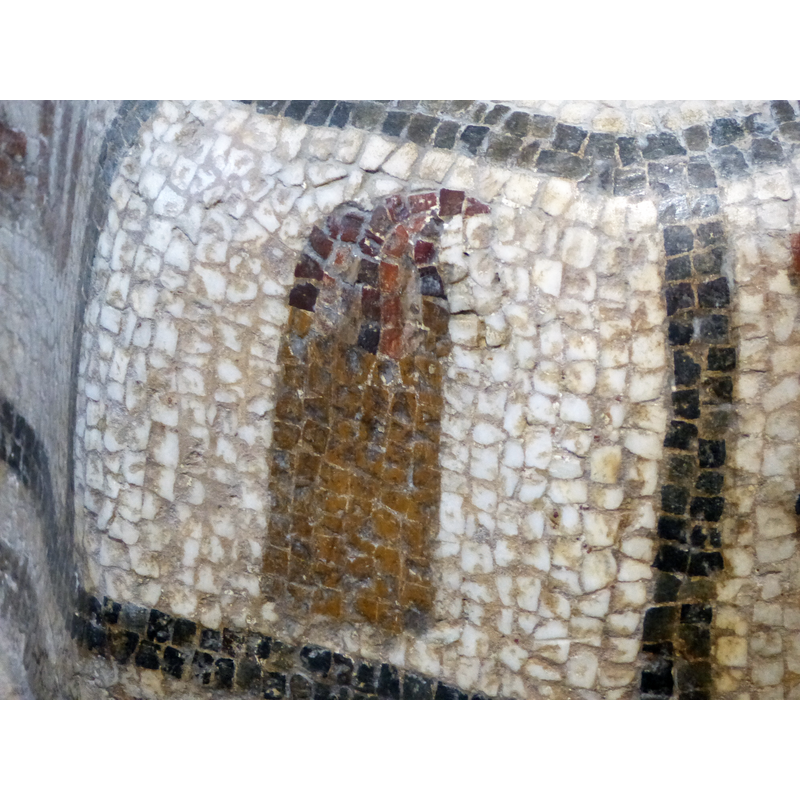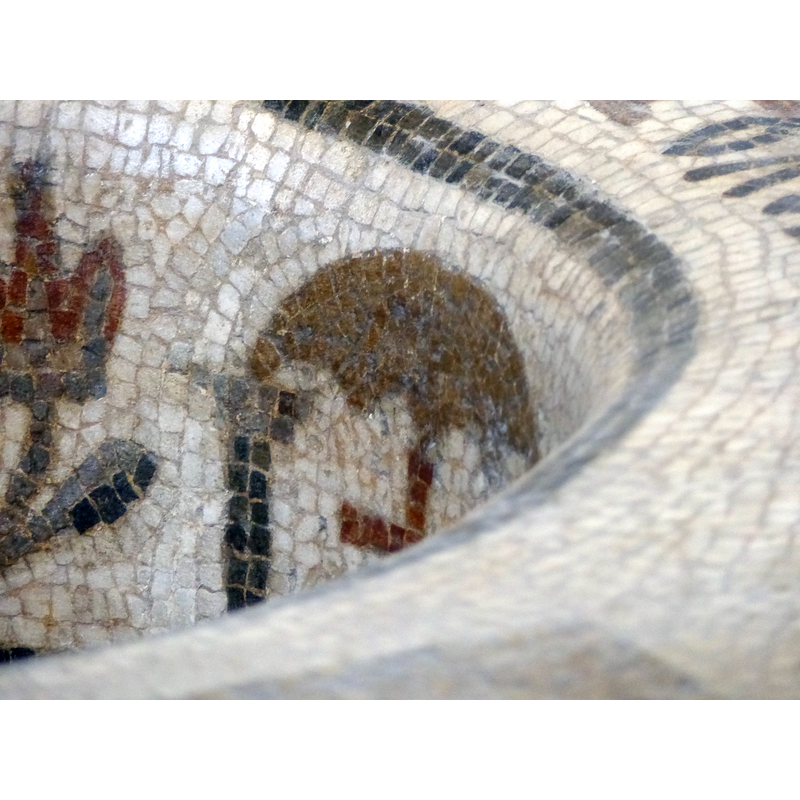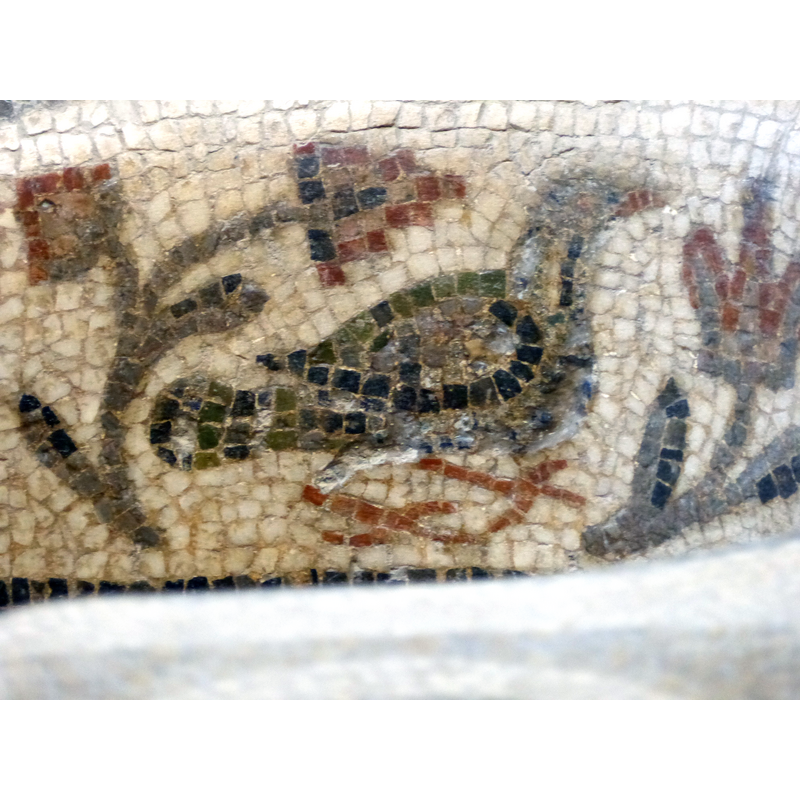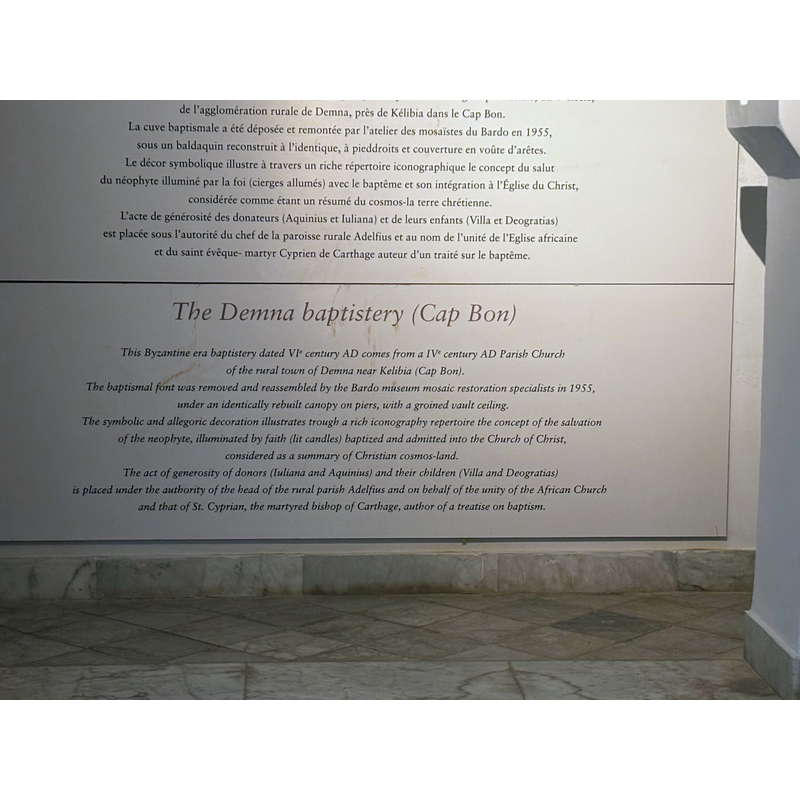Qulaybiyah / Demna / Kelibia / Kélibia
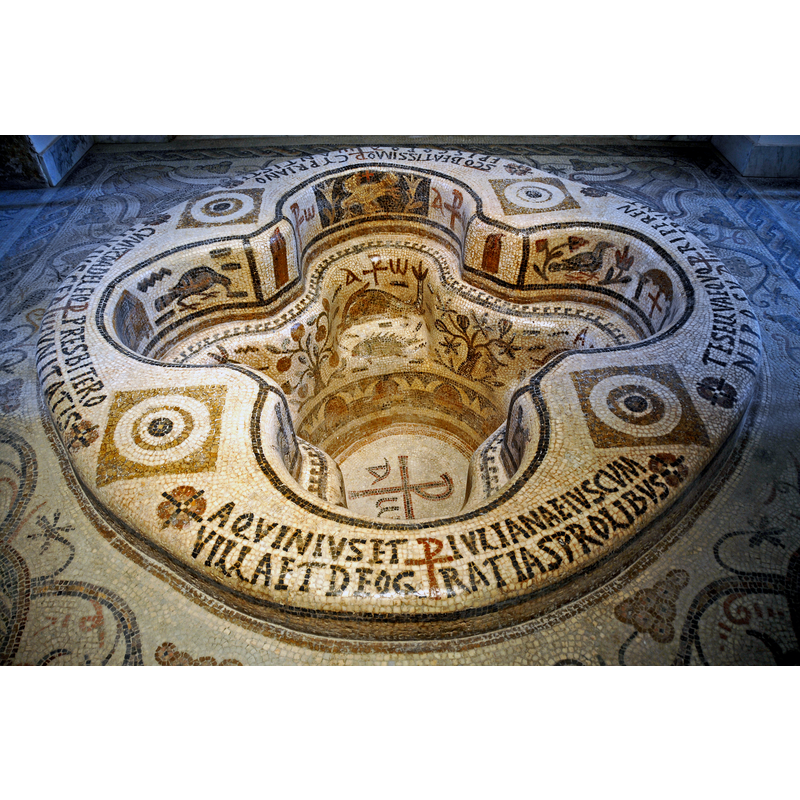
Image copyright © Dennis G. Jarvis, 2012
CC-BY-SA-2.0
Results: 16 records
B1R01: symbol - Columba Dei
Scene Description: the white dove has the cross on its back and is located on the upper basin side of the piscina, between two clusters of alpha-ankh-omega
Copyright Statement: Image copyright © Brian Catlos, 2024
Image Source: digital photograph 24 November 2024 by Brian Catlos
Copyright Instructions: Image and permission received from the author (e-mail of 24 November 2024)
B1R02: Christ - monogram - Alpha and Omega - with ankh - 2
Scene Description: source caption: "Kelibia baptistry detail"
Copyright Statement: Image copyright © Tsaag Valren, 2020
Image Source: digital photograoh 12 February 2020 by Tsaag Valren [https://commons.wikimedia.org/wiki/File:Kelibia_baptistry_detail_(6).jpg] [accessed 19 January 2025]
Copyright Instructions: CC-BY-SA-4.0
B1R03: animal - bird - dove?
Scene Description: several (4?), besides the Columba Dei symbol itself, on this upper side side of the basin -- the reddish beak and legs might suggest a partridge instead of a dove
Copyright Statement: Image copyright © Tsaag Valren, 2020
Image Source: digital photograoh 12 February 2020 by Tsaag Valren [https://commons.wikimedia.org/wiki/File:Kelibia_baptistry_detail_(4).jpg] [accessed 19 January 2025]
Copyright Instructions: CC-BY-SA-4.0
B2R02: Christ - monogram - Alpha and Omega - with ankh
Scene Description: on the seconf level of the basin sides, right underneath the Columb Dei of the first level
Copyright Statement: Image copyright © Brian Catlos, 2024
Image Source: digital photograph 24 November 2024 by Brian Catlos
Copyright Instructions: Image and permission received from the author (e-mail of 24 November 2024)
B2R02: symbol - tree - bearing fruit
BBU01: symbol - the four rivers of paradise (springing from a fountain)
BBU02: design element - motifs - vine - grape
Scene Description: stemming from the corner cauldrons and laden with bunches of grapes
Copyright Statement: Image copyright © Brian Catlos, 2024
Image Source: digital photograph 24 November 2024 by Brian Catlos
Copyright Instructions: Image and permission received from the author (e-mail of 24 November 2024)
BBU03: animal - bird - dove - 4
BBU04: design element - motifs - floral - rosette - 4
BBU05: design element - motifs - concentric circles - 4
Scene Description: a large romboid with a concentric circle motif between the inscriptions of the upper surface of the rim
Copyright Statement: Image copyright © Brian Catlos, 2024
Image Source: digital photograph 24 November 2024 by Brian Catlos
Copyright Instructions: Image and permission received from the author (e-mail of 24 November 2024)
view of font
Scene Description: Source caption: "Gros plan sur le baptistère de Kélibia (deuxième moitié du VIe siècle) au musée national du Bardo, en Tunisie."
Copyright Statement: Image copyright © Dennis G. Jarvis, 2012
Image Source: digital photograph 19 May 2012 by Dennis G. Jarvis [https://commons.wikimedia.org/wiki/File:Musée_du_Bardo_(Tunisie),_baptistère_de_Kélibia.jpg] [accessed 19 January 2025]
Copyright Instructions: CC-BY-SA-2.0
view of font
view of basin - detail
Scene Description: Source caption: "Kelibia baptistry detail"
Copyright Statement: Image copyright © Tsaag Valren, 2020
Image Source: digital photograoh 12 February 2020 by Tsaag Valren [https://commons.wikimedia.org/wiki/File:Kelibia_baptistry_detail.jpg] [accessed 19 January 2025]
Copyright Instructions: CC-BY-SA-4.0
view of basin - detail
Scene Description: Source caption: "Kelibia baptistry detail"
Copyright Statement: Image copyright © Tsaag Valren, 2020
Image Source: digital photograoh 12 February 2020 by Tsaag Valren [https://commons.wikimedia.org/wiki/File:Kelibia_baptistry_detail_(5).jpg] [accessed 19 January 2025]
Copyright Instructions: CC-BY-SA-4.0
animal - bird - plant or tree
Scene Description: Source caption: "Kelibia baptistry detail"
Copyright Statement: Image copyright © Tsaag Valren, 2020
Image Source: digital photograoh 12 February 2020 by Tsaag Valren [https://commons.wikimedia.org/wiki/File:Kelibia_baptistry_detail_(3).jpg] [accessed 19 January 2025]
Copyright Instructions: CC-BY-SA-4.0
INFORMATION
Font ID: 04956QUL
Object Type: Baptismal Font3
Font Century and Period/Style: 6th century, Early Christian
Museum: now installed in the Early Christian department of the Musée National du Bardo in Tunis
Church / Chapel Name: Baptistère du prêtre Felix de Demna / Baptistère de Kélibia / Church of the Priest Felix and the Baptistery of Kélibia
Font Location in Church: [in a museum]
Church Address: [NB: address & coordinates for the church] R3WR+MGM, Kelibia, Tunisia
Site Location: Grombalia, Nābul, Wilāyat, Tunisia / Tūnis, Africa
Directions to Site: The ancient town of "Clupea" is located off the RR31-RN7 crossroads, on the NE coast, near the eastern tip of the Cape Bon Peninsula, in the Hammam Ghezèze, approx. 80 km E of Tunis/Tunisia capital
Additional Comments: re-building of an earlier, 4thC baptistery
Font Notes:
Click to view
Described and illustrated in Davies (1962): the baptismal piscina at Kélibia must be one of the most magnificent from the Early Christian period, probably the 6th century. It is -like many of them were originally- covered in colourful mosaic and located in the centre of a large rectangular mosaic on the corners of which large flower-shaped cauldron full of water may symbolise one of the four rivers of Paradise; from each of these stem fruit-laden grapevines, while doves appear between them; the upper surface of the above-gound portion of the font is richly ornamented with romboids containing concentric circles of different colours, between which appear Latin inscriptions in large lettering [texts not available at present]. The font is tetralobed, i.e., a rounded cruciform shape with three (?) levels of depth; the sides of the upper level show doves, alpha and omega, an ankh, etc.; the flat surface of this "step" has crenellation-like pattern; the vertical side of the next level has chiefly trees on it, but at least one ankh and one alpha and omega are visible in our source. [cf. Index entry for Sbeitla, also in Tunisia, for an image of this type of font, though not as rich as Kélibia]. Noted in Ferguson (2009)
***TO BE COMPLETED: USE CC IMAGES FROM https://commons.wikimedia.org/wiki/Category:Kelibia_baptistry [accessed 8 January 2025]
***TO BE COMPLETED: USE CC IMAGES FROM https://commons.wikimedia.org/wiki/Category:Kelibia_baptistry [accessed 8 January 2025]
Credit and Acknowledgements: We are grateful to Jonathan Lawrence of the University of Notre Dame, South Bend, Indiana, for his notes and images of this site. We are also grateful to Brian Catlos for his photographs of this font
COORDINATES
UTM: 32S 601162 4074309
Latitude & Longitude (Decimal): 36.809222, 10.134111
Latitude & Longitude (DMS): 36° 48′ 33.2″ N, 10° 8′ 2.8″ E
MEDIUM AND MEASUREMENTS
Font Shape: sunken font, cruciform, tetralobed
Basin Interior Shape: tetralobed
Basin Exterior Shape: oval
Diameter (includes rim): 330 x 330 cm*
Notes on Measurements: * Wikipedia entry
INSCRIPTION
Inscription Language: Latin
Inscription Location: on the upper surface of the rim
Inscription Text: "S[an]C[t]O BEATISSIMO CYPRIANO / EPISCOPO ANTISTE CUM S[an]C[t]O ADELFIO PRESBITERO HUIUSCE UNITATIS AQUINIUS ET IULIANA EIUS CUM VILLA ET DEOGRATIAS PROLIBUS TESSELLU[m] AEQUORI PERENNI POSUERUNT"
Inscription Notes: each lobe of the upper rim has a text
Inscription Source: Raynal (2005)
REFERENCES
- Davies, J.G., The Architectural Setting of Baptism, London: Barrie and Rockliff, 1962, ix, 22, 26, 35-38 and pl. 1
- Ferguson, Everett, Baptism in the Early Church: history, theology, and liturgy in the first five centuries, Grand Rapids, MI: William B. Eerdmans, 2009, p. 841
- Palol, Pedro de, Arqueología cristiana de la España romana: siglos IV a VI, Madrid, Valladolid: Consejo Superior de Investigaciones Científicas, Instituto Enrique Flórez, 1967, p. 161 fn37
- Slim, Hédi, La Tunisie antique: de Hannibal à saint Augustin, Paris: Mengès, 2001, p. 227
